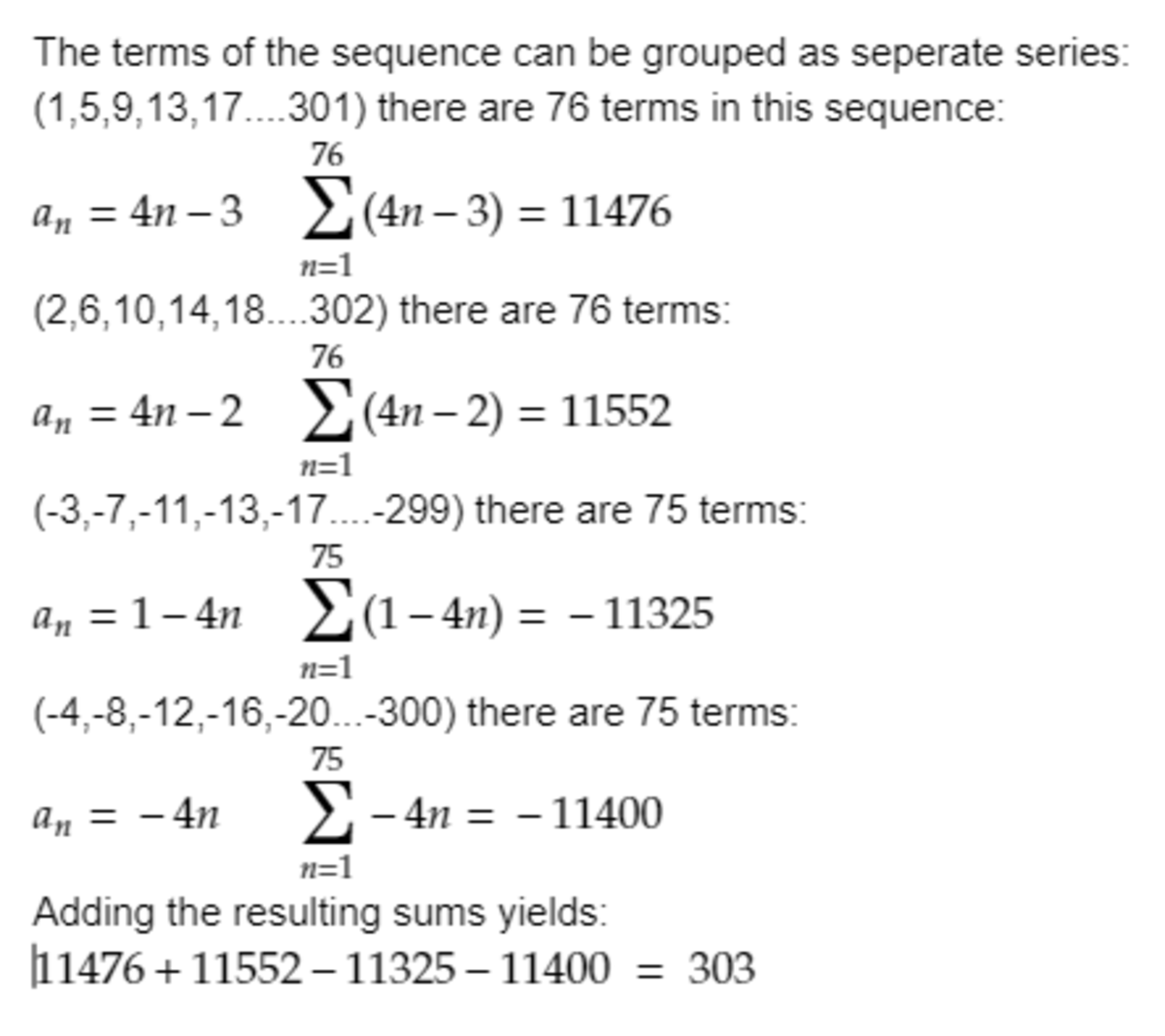Strange Sum
1 + 2 − 3 − 4 + 5 + 6 − 7 − 8 + … + 3 0 1 + 3 0 2 = ?
Clarification : The sum keeps alternating between two distinct positive numbers and two distinct negative numbers.
The answer is 303.
This section requires Javascript.
You are seeing this because something didn't load right. We suggest you, (a) try
refreshing the page, (b) enabling javascript if it is disabled on your browser and,
finally, (c)
loading the
non-javascript version of this page
. We're sorry about the hassle.
8 solutions
Nice solution! Can we generalize this summation up to n terms?
Log in to reply
H'mmm. For any number of terms that's an exact multiple of 4, say 4n terms, the answer is clearly -4n. Since the next term is (4n+1) added, for 4n+1 terms the answer is 1. the next term is (+ 4n+2) so that yields, for 4n+2 terms,an answer of 4n+3. And the next term is subtracted (4n+3), so for any number (4n+3) terms the answer is 0. that covers every case.
( - 0 + 1 +2 - 3 ) = 0 , ( - 4 + 5 + 6 - 7 ) = 0 , .................................. ( - 296 + 297 + 298 - 299 ) = 0 that's 75 grouping it's sum = 0.0 ( - 300 + 301 + 302 ) = 303 OK
Nice solution !
Can't understand how 302 came
As I find that the mean of (a)+(a+1) equals to (a-1)+(a+2) , hence 2-3-4+5 equals to 0, and 6-7-8+9 equals to zero, and vice versa, hence the answer is 1+302, which is 303
Nice solution!
(1 + 2 - 3) = 0
(- 4 + 5 + 6 - 7) = 0 (- 8 + 9 + 10 - 11) = 0 ... (- 300 + 301 + 302) = 303
or
(- 4 + 5 ) = 1 < = > (- 8 + 9 ) = 1 < = > ... < = > (-300 + 301) = 1
1 + 302 = 303
1+(2-3-4+5)=1+0 (6-7-8+9)+(10-11-12+13)... +(298-299-300+301)=0
So
1+302 = 303
You can gather every 4 terms into 1 new terms, i.e.: ( 1 + 2 − 3 − 4 ) , ( 5 + 6 − 7 − 8 ) , . . .
then you will get bunch(s) of − 4 . To count the the number of terms (of -4), you will find the greatest integer (close to 302) that's divisible by 4, that is 300. So, there are 4 3 0 0 = 7 5 terms of − 4 then you will have 3 0 1 + 3 0 2 as the "left-over".
So, the total sum is: 7 5 ∗ ( − 4 ) + 3 0 1 + 3 0 2 = 3 0 3
1 + 2 − 3 − 4 + 5 + 6 − 7 − 8 + … + 3 0 1 + 3 0 2
1 + 3 0 2 = 3 0 3
2 + 3 0 1 = 3 0 3
− 3 − 3 0 0 = − 3 0 3
− 4 − 2 9 9 = − 3 0 3
The sum of these numbers cycle up to 606 back to 0 every 4 pairs
Total number of pairs = 2 1 3 0 2 = 1 5 1
1 5 1 ( m o d 4 ) = 3
This means we just need the sum of the first 3 pairs
3 0 3 + 3 0 3 − 3 0 3 = 3 0 3
Before the term 5 , the sum of the first 4 terms is − 4 . Before the term 9 , the sum of the first 8 terms is − 8 . Therefore, the sum of all the terms before the term 3 0 1 is − 3 0 0 .
S = − 3 0 0 + 3 0 1 + 3 0 2 = 3 0 3

( 1 + 2 − 3 − 4 ) = − 4 , ( 5 + 6 − 7 − 8 ) = − 4 , … , ( 2 9 7 + 2 9 8 − 2 9 9 − 3 0 0 ) = − 4 .
That's 75 groupings of -4. that's a total of -300.
(-300) + 301 = 1
1 + 302 = 303